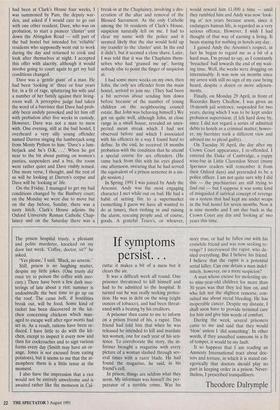If symptoms persist. . .
The prison hospital trusty, a pleasant and polite murderer, knocked on my door last week. 'Coffee, doctor, sir?' he asked.
`Yes please,' I said. 'Black, no arsenic.'
Still, prison is no laughing matter, despite my little jokes. (One trusty did once try to poison the coffee with mer- cury.) There have been a few dark mut- terings of late about a riot: summer is undoubtedly the best time to go up on the roof. The casus Belli, if hostilities break out, will be food. Some kind of racket has been discovered in the kit- chen concerning chickens which man- aged to escape well after rigor mortis had set in. As a result, rations have been re- duced. I have little to do with the kit- chen, except to inspect it every now and then for cockroaches and to sign various forms every day (Smith may have an or- ange, Jones is not excused from eating potatoes), but it seems to me that the at- mosphere there is a little tense at the moment.
I also have the impression that a riot would not be entirely unwelcome and is awaited rather like the monsoon in Cal- cutta: it makes a bit of a mess but it clears the air.
It was a difficult week all round. One prisoner threatened to kill himself and had to be admitted to the hospital. It turned out he was really seeking protec- tion. He was in debt on the wing (eight ounces of tobacco), and had been threat- ened with a beating by his creditors.
A prisoner then came to me to inform on a prison friend of his, a rapist. This friend had told him that when he was released he intended to kill and mutilate ten women, one for each year of his sen- tence. To corroborate the story, the in- former brought a magazine with every picture of a woman slashed through sev- eral times with a razor blade. He had found the magazine, he said, in his friend's cell.
In prison, things are seldom what they seem. My informant was himself the per- petrator of a terrible crime. Was his story true, or had he fallen out with his erstwhile friend and was now seeking re- venge? I interviewed the rapist, who de- nied everything. But I believe his friend. I believe that the rapist is a potential serial killer. Can one detain a man indef- initely, however, on a mere suspicion?
A man whose excuse for molesting six- to nine-year-old children for more than 30 years was that they led him on, and who felt not the slightest remorse, con- sulted me about rectal bleeding. He has inoperable cancer. Despite my distaste, I shall soon have to provide terminal care for him and give him words of comfort.
During the week, several prisoners came to me and said that they would `blow' unless I 'did something'. In other words, if they assaulted someone in a fit of temper, it would be my fault.
It so happens that I am reading an Amnesty International tract about doc- tors and torture, in which it is stated cat- egorically that doctors should play no part in keeping order in a prison. Never- theless, I prescribed tranquillisers.
Theodore Dalrymple


















































 Previous page
Previous page